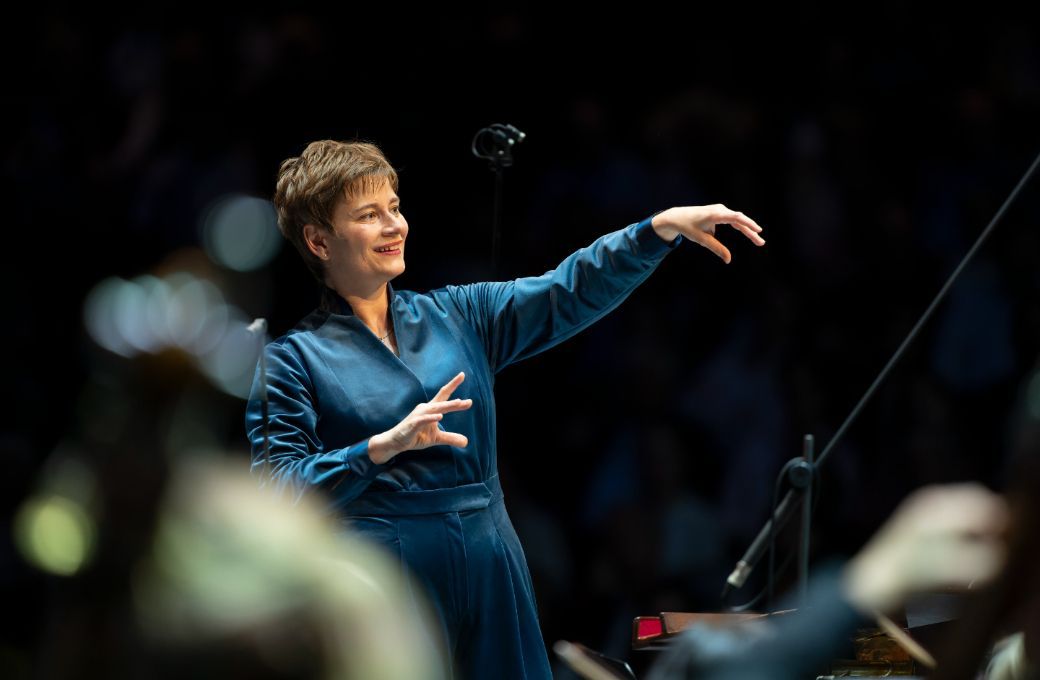The BBC Philharmonic ended their Proms last night, conducted by its newly appointed Prinicipal Guest Conductor, Anja Bihlmaier, with German violinist Tobias Feldmann. With major German works bookending the programme, American composer Sarah Gibson’s warp & weft at its centre was certainly a striking contrast.
First, Beethoven’s Violin Concerto, with a highly engaging performance from Feldmann, producing a bright, lively tone and lyrical line throughout. He opted for Wolfgang Schneiderhan’s cadenza inspired by Beethoven's piano concerto arrangement, which include interjections from the timpanist, drawing on the opening's five drum taps. Combined with tremolo double-stopping and virtuosic scale runs from the soloist, the martial effect is arresting, and was delivered with flourish, but the Royal Albert Hall acoustic compromised ensemble. Feldman’s ease of touch and joyful tone was a delight. However, with an emphasis on the lyrical and melodic, momentum in the outer movements suffered, with Bihlmaier allowing the orchestra to lag occasionally. So this was a performance of great beauty, with strong orchestral playing from the woodwinds in particular, but missing bite at the more dramatic moments. As if to confirm this emphasis on beauty of line, Feldmann and the orchestra gave us a sweet, delicately judged performance of Elgar’s Salut d'amour.
Sarah Gibson was scheduled to receive a BBC-commissioned premiere tonight, but she died suddenly less than a month ago, aged just 38. Instead the BBC Philharmonic performed Gibson’s 2021 composition, warp & weft. Inspired by artist Miriam Schapiro’s term “femmage”, which celebrates women’s artistic practices such as collage and decoupage, this work focusses on weaving. On first listening, I couldn’t always pin down the unifying weft of horizontal melody against the vertical warp of chords. But there was a sense of momentum pushing through the collage of orchestral effects, including bowed vibraphone, torn paper, sandpaper blocks and brushed timpani. Near the opening, a prepared piano (with blu-tac, according to the score, although it looked like a stick was used here) created a fascinating effect, with rippling, muted scales. Bihlmaier steered the orchestra through the complex rhythms in a work full of interest and challenge.

Brahms’ Fourth Symphony is a monument to formal structure and intellectual complexity, yet is also full of passion and drama. Bihlmaier gave the opening, which launches without introduction, a watery flow, (think Smetana’s Vltava), setting the tone for a fluid reading. The horn solo opening the second movement was open and warm and the blend as the woodwind joined was exquisite. The cellos provided rich lyricism in their big tune, with the violas singing through the texture when they got their turn. The crucial unexpected drop from E major down to C major at the end of the movement passed by somewhat unnoticed. This was a pity, as the subsequent C major Scherzo delivered the first real edge of the evening, with healthy pace and driving energy.
At its golden finish, triangle ringing in our ears, and following another of Brahms’ anticipations, this time of the Passacaglia theme to come, we headed into the monumental Finale. Bihlmaier shaped the progress of the unfolding variations with a strong architectural sense. We had incisive string playing, an enchanting flute solo and a burnished chorale from the trombones and horn, with energy and commitment from the orchestra throughout. Bihlmaier pushed on into the final one-in-a-bar coda's driving hemiolas. Whilst this wasn’t the most powerful rendition of Brahms’ masterpiece, there was much to enjoy, and it will be good to see the relationship between Bihlmaier and the BBC Philharmonic further develop.


